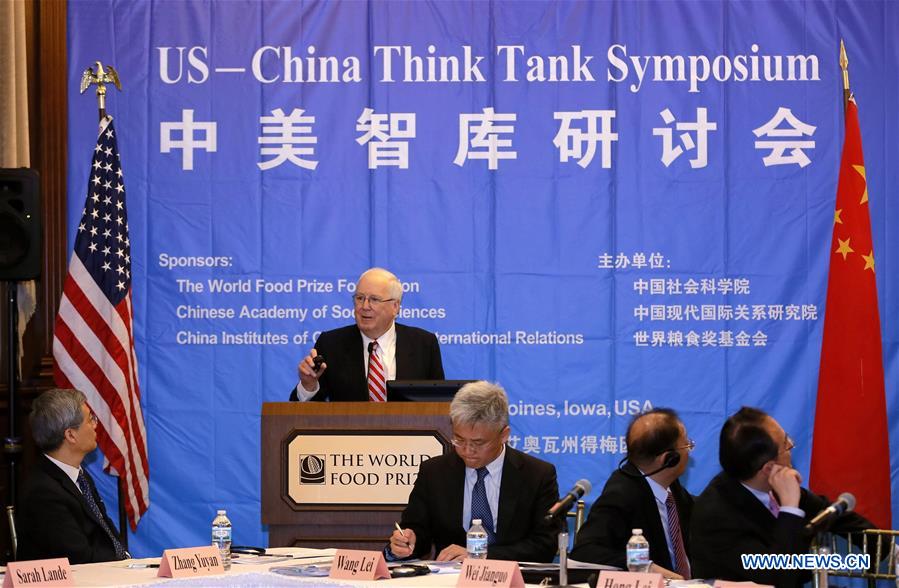
Kenneth Quinn, president of World Food Prize Foundation, addresses the U.S.-China Think Tank Symposium in Des Moines, the United States, on June 12, 2017. The prospects of U.S.-China relations are very promising, according to participants of the U.S.-China Think Tank Symposium, which opened Monday in Des Moines, capital of U.S. state of Iowa. (Xinhua/Wang Ping)
DES MOINES, the United States, June 13 (Xinhua) -- The prospects of U.S.-China relations are promising in various fields including economic and trade cooperation, agricultural exchange, education and investment, according to participants in the U.S.-China Think Tank Symposium held here Monday.
More than 20 Chinese and U.S. experts and scholars gathered Monday in Des Moines, capital of the mid-west U.S. state of Iowa, to deliberate on such topics as China-U.S. relations, local cooperation and the prospects of the relationship between the two countries.
In a speech at the opening ceremony, Former Minister of the State Council Information Office Zhao Qizheng said rapid development of China-U.S. economic and trade cooperation is not only an epitome of China-U.S. relations, but also helps build up a solid foundation for China-U.S. cooperation in other fields.
Statistics show that China-U.S. trade volume grew from 2.5 billion U.S. dollars in 1979 to 524.3 billion dollars in 2016, a rise of 209 times, according to Chinese Consul General in Chicago Hong Lei.
China is the United States' largest export market outside North America, and is also one of the fastest growing major export markets of the United States.
"People of both countries have benefited from this economic and trade relationship," said Zhao, "China-U.S. economic and trade cooperation promises huge opportunities and potentials, and the prospects are very promising."
The relationship between China and the United States has experienced ups and downs all the way along but has kept forging ahead as economic and trade cooperation played the roles of "ballast stone" and "propeller," Hong said.
In 2016, bilateral service trade volume between the two countries exceeded 100 billion dollars, and two-way investment totaled 170 billion dollars.
"China-U.S. relationship is one of the most important bilateral relations in the world, for which economic and trade cooperation is the most active and lasting driving force," Hong said.
Statistics also show a rosy picture of China-U.S. partnership in terms of education and investment.
According to a report published by U.S. Immigration and Customs Enforcement in May 2016, the United States is Chinese students' top destination for studying abroad, as some 353,000 Chinese students account for 34 percent of the total number of international students in the United States, said Hong.
The Chinese Ministry of Commerce estimated that Chinese students studying in the United States spent about 45,000 dollars per person in 2016, contributing around 15.9 billion dollars to the U.S. revenue.
U.S.-invested enterprises in China have maintained good performance and gained high profits. In 2016, the total revenue of U.S.-funded banks, insurance and security companies reached 48 billion dollars, Hong said.
In the meantime, Chinese investment in the United States is growing rapidly. A report by the National Committee on U.S.-China Relations and Rhodium Group indicated that Chinese enterprises invested 45.6 billion dollars in the United States in 2016, a 200-percent increase from the previous record set in 2015.
Earlier on Sunday, Chinese think tank researchers visited Kimberley Farm, where they exchanged views with farm owner Rick Kimberley on management of modern farms and also on agricultural exchange between the two countries.
As a witness to the booming agricultural ties between China and Iowa, the Kimberley family is not only exporting soybeans to China, but also introducing their advanced farming technology to China, the largest soybean export market for the United States.
A model farm which will be fashioned after the Kimberleys' one is set to be built next year in north China's Hebei Province, a sister province of Iowa.
"China-U.S. relations are not only about the government-level exchanges, but more importantly lie in the exchanges between people from the two countries. The close people-to-people exchanges could further contribute to the development of bilateral relations," said Zhao after visiting the Kimberleys' farm.
"I'm very impressed by American farmers' strong emphasis on the importance of stable bilateral economic relationship," said Wei Jianguo, China's former vice minister of commerce.
According to a report released by the U.S.-China Business Council, the U.S.-China trade relationship actually supports roughly 2.6 million jobs in the United States across a range of industries.
As the Chinese economy transits into the modern age, there is ample reason to believe U.S. exports can grow even more rapidly, and U.S. firms can harvest significant revenues from their investments, said the report.
(Xinhua reporters Xu Jing, Yang Shilong and Jiang Yujuan contributed to the story)














